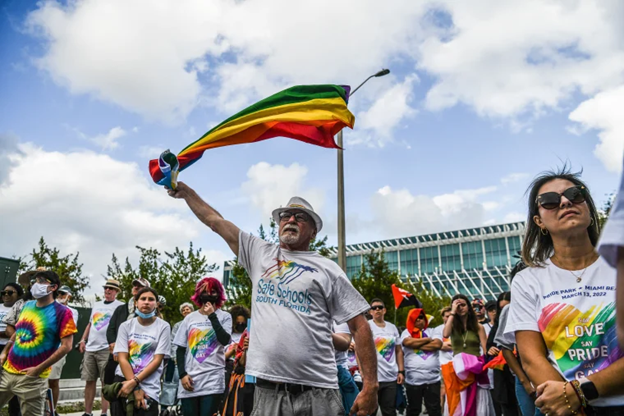A Florida School District’s New Policy Can Out LGBTQ+ Students to their Parents
Photo courtesy of NBS News
Lucy Waskiewicz | Contributing Writer
A Florida school district has implemented a policy that requires staff to notify the parents of students who ask to be referred to by different names or pronouns than those assigned to them at birth.
NPR affiliate WUSF recently published a diagram released by The Sarasota County School District that instructs staff to alert the school’s administrator or counselor if a student requests to be called by a new name or pronouns. The counselor and/or administrator will then notify the student’s parents of the request.
If the parents do not consent to their child’s request, the school staff is prohibited from addressing the student by their preferred name or pronouns– continuing legislation of anti-LGBTQ+ sentiment.
Senior Christian Comment is the president of Spectrum, the University of Dayton’s LGBTQ+ student advocacy organization. He expressed his disappointment with the policy.
“As a student myself, I think it is both outrageous and it fills me with sadness,” Comment said. “To use the legal system to find out information about your children rather than having an open and honest environment shows that those parents only want children who will follow what they want and not what the children want.”
The policy comes hot on the heels following Florida’s passing of the Parental Rights in Education bill, better known as the “Don’t Say Gay” law. The bill claims to protect “the fundamental rights of a parent to direct the upbringing, education, health care, and mental health of a minor child.”
Much of the bill’s criticism, as well as its nickname, stems from its supporters’ focus on keeping LGBTQ+ content out of the classroom. “Don’t Say Gay” bans lessons on sexual orientation and gender identity from kindergarten through third grade– which critics argue only serves to isolate and harm LGBTQ+ students.
The Trevor Project, a nonprofit focused on suicide prevention among queer youth, has been an outspoken opponent of the bill, stating that it erases “LGBTQ identity, history, and culture– as well as LGBTQ students themselves.”
Comment reflected on the nature of the bill as being harmful to students that might already struggle to openly express their gender or sexual identities.
“Growing up as a member of the LGBTQ+ community oftentimes means not being able to be ‘out’ at home or in school,” Comment said. “For students to be comfortable enough with sharing that piece of themselves in a school environment warms my heart, but oftentimes the reality may be that it is because they cannot share their identity with their family for fear of backlash.”
According to the National Center for Education Statistics, Sarasota County hosts 62 schools. Its new policy on students’ sexual orientation and gender identity was created and enacted by Superintendent Brennan Asplen without a board vote and will affect over 42,000 students.
The new practice of outing is in contrast to the district’s previous guidance stating that “it is up to the student, and the student alone, to share her/his/their identity.”
“Outing” refers to when a person or group of people make known the sexual orientation and/or gender identity of an LGBTQ+ person without their consent. The negative outcomes of being outed can range anywhere from bullying to forced homelessness following family rejection.
Outing can become deadly when practiced at schools in particular. The last decade has seen multiple highly publicized instances where high school or college students have taken their own lives mere hours or days after being outed.
Meanwhile, research has found LGBTQ+ students are already four times as likely to attempt suicide compared to their straight and cisgender peers.
Critics of Sarasota County’s policy include its teachers, many of whom are worried about indirectly causing students harm if parents respond negatively to their child’s identity.
Gail Foreman, Sarasota County history teacher, cited this as being a large factor in her opposition to the bill.
“I don’t want to come home every night and know that I may have contributed to one of my students being harmed,” Foreman said.
You can read the original publication and view the diagram published by WUSF on their website.
More information on Spectrum can be found on the organization’s website or Instagram.
For more news, like Flyer News on Facebook and follow us on Twitter (@FlyerNews) and Instagram (@flyernews).

